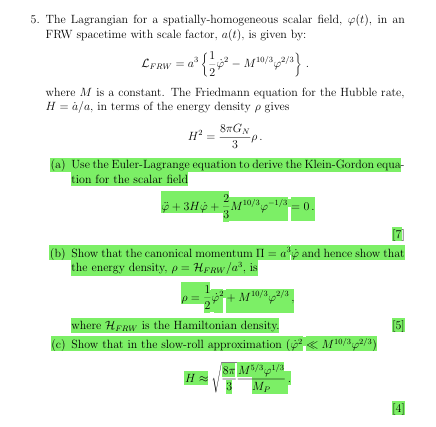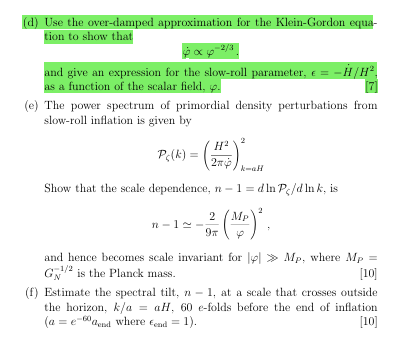(Solved): Please answer parts D, E and F The Lagrangian for a spatially-homogeneous scalar field, \phi (t), i ...
Please answer parts D, E and F The Lagrangian for a spatially-homogeneous scalar field,
\phi (t), in an FRW spacetime with scale factor,
a(t), is given by:
L_(FRW)=a^(3){(1)/(2)\phi ^(˙)^(2)-M^((10)/(3))\phi ^((2)/(3))}.where
Mis a constant. The Friedmann equation for the Hubble rate,
H=(a^(˙))/(a), in terms of the energy density
\rho gives
H^(2)=(8\pi G_(N))/(3)\rho .(a) Use the Euler-Lagrange equation to derive the Klein-Gordon equa- tion for the scalar field
\phi ^(¨)+3H\phi ^(˙)+(2)/(3)M^((10)/(3))\phi ^(-(1)/(3))=0.(b) Show that the canonical momentum
\Pi =a^(3)\phi ^(˙)and hence show that the energy density,
\rho =(H_(FRW))/(a^(3)), is
\rho =(1)/(2)\phi ^(˙)^(2)+M^((10)/(3))\phi ^((2)/(3)). where
H_(FRW)is the Hamiltonian density. (c) Show that in the slow-roll approximation
(\phi ^(2)&M^((10)/(3))\phi ^((2)/(3)))
H~~\sqrt((8\pi )/(3)(M^((5)/(3))\phi ^((1)/(3)))/(M_(P))).(d) Use the over-damped approximation for the Klein-Gordon equa- tion to show that
9^(˙)prop\phi ^(-(2)/(3)).and give an expression for the slow-roll parameter,
\epsi lon=-(H^(˙))/(H^(2)). as a function of the scalar field,
\phi . (e) The power spectrum of primordial density perturbations from slow-roll inflation is given by
P_(\zeta )(k)=((H^(2))/(2\pi (\phi ^(˙))))_(k)=\alpha H^(2)Show that the scale dependence,
n-1=dln(P_(\zeta ))/(d)lnk, is
n-1≃-(2)/(9\pi )((M_(P))/(\phi ))^(2),and hence becomes scale invariant for
|\phi |>=M_(P), where
M_(P)=
G_(N)^(-(1)/(2))is the Planck mass. (f) Estimate the spectral tilt,
n-1, at a scale that crosses outside the horizon,
(k)/(a)=aH,60e-folds before the end of inflation where
{:\epsi lon_(cad )=1).

